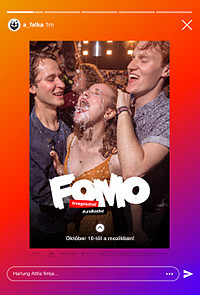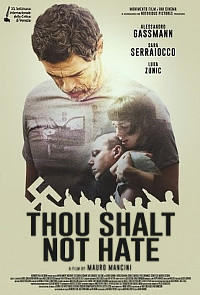| SHADOWS ON THE WALL | REVIEWS | NEWS | FESTIVAL | AWARDS | Q&A | ABOUT | TALKBACK | |||||||||||||||||||||||||||||
 Shadows off the beaten path Shadows off the beaten pathIndies, foreign, docs and shorts...
On this page:
FOMO (FEAR OF MISSING OUT) |
NO HARD FEELINGS |
THOU SHALT NOT HATE
| |||||||||||||||||||||||||||||
| See also: SHADOWS FILM FESTIVAL | Last update 10.Nov.20 | |||||||||||||||||||||||||||||
|
FOMO Fear of Missing Out Review by Rich Cline | 
 Is it streaming?
| 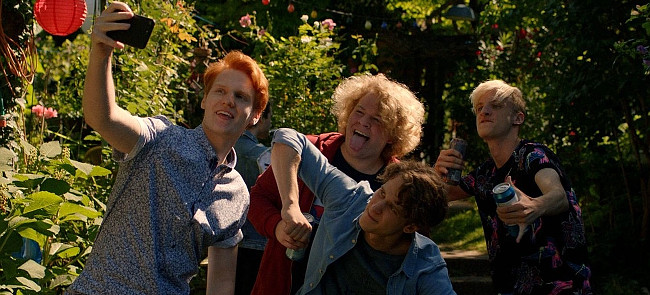 Fast and snappy, this heavily pointed Hungarian drama is shot like an MTV show from around 1990, with quick-cut, hand-held scenes of pretty young people at raucous parties. It's also a vicious satire of lad culture that leads to a provocative, unsettling drama about assault. So while the film feels more than a little melodramatic, it's an important topic dealt with in a story that continually challenges accepted attitudes. Four rambunctious teen boys calling themselves the Wolves -- Gergo, Patrik, Bandi and Abris (Goletsas, Bouquet, Pokorni and Sipocz) -- launch a YouTube channel making comedy videos that involve outrageous dares and pranks. Always on the edge of propriety, they step way over the line at a party when they target Lilla (Laszlo), the daughter of an annoying teacher (Gabor), and videotape an assault on her. Of course it goes viral, after which Lilla disappears. So the boys set out to find her to clear their name, getting up to even more vile antics. The casual laddish misogyny, pushed further with alcohol, is hard to watch. Away from the Wolves, Gergo is a serious student who has just won a prestigious university scholarship. Although when he's implicated in Lilla's disappearance, his father (Stohl) is more worried about his own reputation than his son. Meanwhile, the boys are beginning to learn what's wrong with their approach to girls, not that it will sink in much. Performances are loose and off-the-cuff, with quick-fire dialog delivered in short, sharp bursts. This doesn't allow for much individuality in the characters, but Goletsas is able to reveal Gergo's hesitance about his friends, even if he fails to resist their goading. He's the only one who has a crisis of conscience, and the script isn't isn't wholly convincing. So the more complex, compelling role belongs to Laszlo as a strong young woman trying to take back her life. This film takes aim at the entire society, where being a man consists of acting tough, talking smut and demonstrating power over women. Is it any wonder that teen boys don't know how to act? Still, it's shocking that filmmaker Hartung effectively generates sympathy for a rapist, seeming to argue that he's just a kid who got caught up in a bad situation and didn't realise what he was doing or how it would derail his life. This leads to some moving scenes, including a climactic confrontation that's over-the-top but still powerful.
|
| No Hard Feelings Futur Drei Review by Rich Cline | 
| 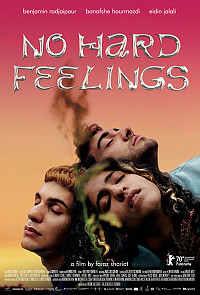 dir Faraz Shariat prd Paulina Lorenz scr Faraz Shariat, Paulina Lorenz with Benny Radjaipour, Banafshe Hourmazdi, Eidin Jalali, Mashid, Masser, Maryam Zaree, Armin Wahedi Yeganeh, Abak Safaei-Rad, Jurgen Vogel, Knut Berger, Paul Lux, Niels Bormann, Hadi Khanjanpour release Ger 24.Sep.20, US Sep.20 fff, UK 13.Nov.20 20/Germany 1h32 BERLIN FILM FEST Is it streaming?
| 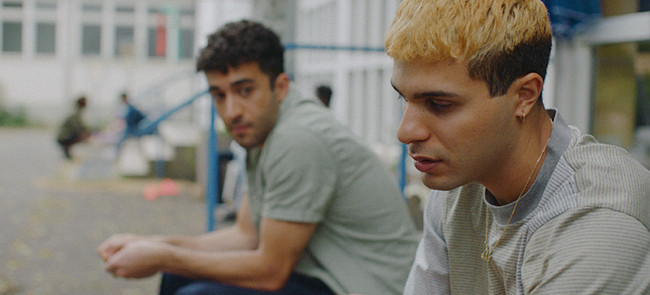 Assembled with an earthy authenticity, this German drama is a vivid depiction of the immigrant life for a younger generation in a country that isn't always welcoming. It's also a nicely observed story of first love, underpinned by some strong thematic resonance. Refreshingly, director-cowriter Faraz Shariat lets the events unfold organically, without pushing too many of the darker plot points. This observational approach is skilfully maintained and deeply involving. Living it up on Germany's gay scene, the lively 20-something Parvis (Radjaipour) is the son of exiled Iranians and barely remembers his homeland. After being caught shoplifting, he's sentenced to community service at a refugee shelter. But the stress of translating for these desperate people is hard on him. Then he strikes up a friendship with young Iranian Bana (Hourmazdi) and her brother Amon (Jalali). As they spend time together, it takes awhile for Parvis and Amon to admit that they're attracted to each other. And then immigration issues make everything feel precarious. There's a blast of youthful energy infusing this film and informing the central relationship between these three engaging people. The camera continually captures little points of connection between them, including glances and touches that reveal unspoken thoughts and yearnings. So as they become closer, their relationship becomes deeper than they expect it to be. Alongside this, Shariat uses striking visual touches to create a vivid sense of the situation for refugees in Germany, including the bigotry that's woven into the system. With an expressive face and loose physicality, Radjaipour remains grounded as the easy-going Parvis, who loves his raves, parties and meeting anonymous guys for sex, but perhaps he's discovered something that's been missing. He's likeable even if he's a mess, so it's easy to forgive some diva tendencies. His friendship with Hourmazdi's hilariously cynical Bana is sparky, as they get close very quickly. It takes a bit longer for Amon to drop his guard, and Jalali plays him with a charming, watchful intelligence. The film is laced with sweet, offhanded humour that eliminates any sense of heightened drama, which creates an almost documentary tone. This also makes the inter-connections between the characters feel bracingly personal. Along with this warmly humane story, there are more story-driven issues with the siblings' refugee status that give the film a quietly wrenching urgency. These things sometimes seem to distract from the central romantic narrative. But for these three young people, having a future is the whole point.
|
| Thou Shalt Not Hate Non Odiare Review by Rich Cline | 
VENICE FILM FEST  Is it streaming?
| 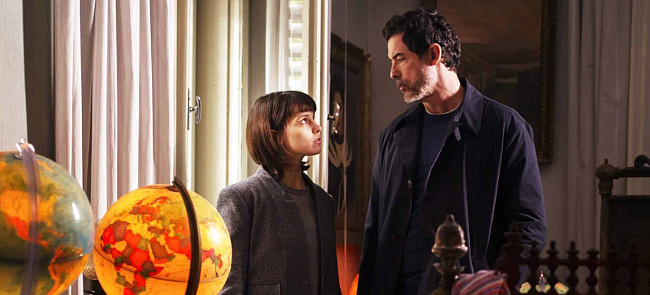 Skilfully shot and edited, this involving Italian drama takes a complex approach to the rise in right-wing hatred across the world, holding the focus tightly on a very personal story. Director-cowriter Mauro Mancini keeps the tensions simmering all the way through the film, creating suspense over whether this will erupt into a violent clash or a chance for redemption. And the complex emotions gurgling underneath make it darkly involving. In Trieste, athletic middle-aged surgeon Simone (Gassmann) leaps to the rescue at a car crash, but stops helping when he sees that the driver is covered in Nazi tattoos. Wracked with guilt, he answers an ad offering the victim's 27-year-old daughter Marica (Serraiocco) a job as a cleaner, as she needs to care for pre-teen brother Paolo (Buonora). But their 17-year-old white-supremacist brother Marcello (Zunic) is furious that she's working for a Jew. And he begins to directly threaten Simone, who refuses to back down. So Marcello gathers his goons for an attack. The film opens with a painful scene in which young Simone protests against his father (Fusco) about drowning a litter of kittens, then gives in. Later, there are several scenes that reveal how Simone is driven by his deep-seated guilt, even as he stands up to Marcello's hatred. But all of this is raising deeply buried feelings connected to Simone's strained relationship with his recently deceased Holocaust-survivor father. Meanwhile, Marica is facing her own issues, threatened by right-wing gangster Rocco (Acquaviva). And of course, there's that other shoe waiting to drop. Gassmann's performance is introspective and powerful, revealing a tortured soul that he has clearly been neglecting, while distracting himself with work and sporting hobbies. And new feelings are causing him to revisit his faith. His growing friendship with the alert Serraiocco's sensitive, open-minded Marica is intriguing, even when the story takes a swerve toward a yucky romance. Meanwhile, Zunic has astonishing screen presence as Marcello, offering subtle touches in the performance that reveal shadings to his knee-jerk hatred. The interpersonal drama, and the connections between these disparate characters, are far more involving and meaningful than the thriller elements that grow in the background. The film's low-key approach to such a high-octane topic is fascinating. This adds a jarring contrast to scenes of the skinheads braying violently against foreigners. Where the film goes with all of this is unusually thoughtful, treating the characters as real people who aren't defined by their misguided actions or opinions.
| 
See also: SHADOWS FILM FESTIVAL © 2020 by Rich Cline, Shadows
on the Wall
HOME | REVIEWS | NEWS | FESTIVAL | AWARDS
| Q&A | ABOUT | TALKBACK | | |||||||||||||||||||
